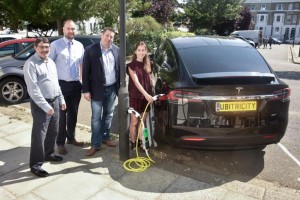Electric mobility may be growing at a rapid pace around the world, but it could be some time before e-cars go mainstream.
Out of more than 5.1 million electric cars on the roads globally, nearly two million electric cars were sold in China, Europe and the U.S. last year. The International Energy Agency is aiming to increase the share of electric vehicles globally to 30% by 2030.
Chinese automakers Beijing Electric Vehicle and BYD, U.S. electric carmaker Tesla and Japan’s Nissan were the top producers. Together, they manufactured approximately 560,000 of the world’s fully electric cars.
Still, this number accounts for less than 1% of the one billion vehicles being driven today, according to statistics by BloombergNEF for the 2019 Electric Vehicle Outlook.
Doling out incentives
As greater importance is placed on reducing carbon emissions, more countries are providing incentives to build integrated infrastructure, and to encourage drivers to switch to electric vehicles.
Norway offers tax exemptions for electric car buyers — and 46% of automobiles in the country are electric. Shenzhen in China is one of the few cities equipped with a fleet of fully electric buses. Others like the U.S. and India have set targets to aid their countries to stay on track toward a carbon emission-free vehicle industry.
“In countries around the world, where there is an over-arching commitment towards the environment, the city has been more than willing to provide the charging infrastructure,” Subodh Mhaisalkar, executive director for the Energy Research Institute at the Nanyang Technological University in Singapore, told CNBC.
It’s not just cars and buses becoming electric vehicles. Other modes of electric transportation, such as motorcycles, ships, and tuk-tuks — or Thai rickshaws, are also popping up.
However, we might still be a long way from reducing our carbon footprint, especially since 38% of the world’s electricity still comes from burning coal.
With more electric vehicles and charging stations being built, demand for electricity will also increase. According to projections by BloombergNEF, electric vehicles will cause global electricity consumption to rise 6.8% by 2040.
Challenges for electric carmakers
That’s not the only dilemma in the industry.
Harley-Davidson joins a growing list of companies struggling to find a foothold.
British appliance maker Dyson, known for household products like vacuum cleaners and bladeless fans, called off its electric car project in October.
Days later, Harley-Davidson halted production of its fully electric motorcycle, known as the LiveWire. The decision came after a problem with its charging mechanism was discovered, barely a year after the motorcycle’s debut.
Still, financial and technological difficulties might make it difficult for these traditional companies to make their forays into the electric industry.
Post time: Jan-07-2021





